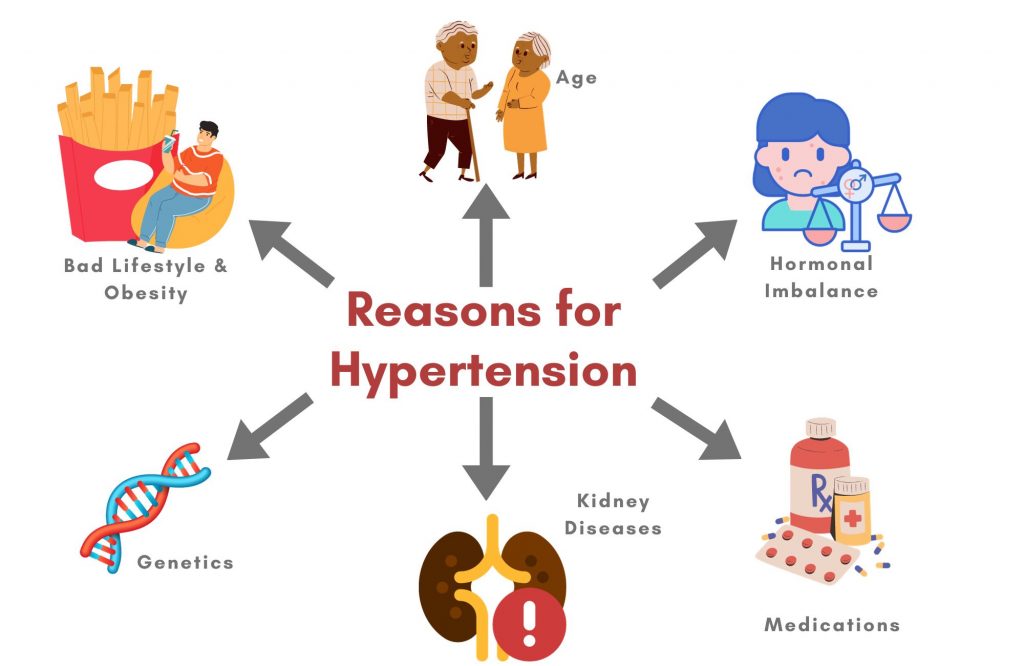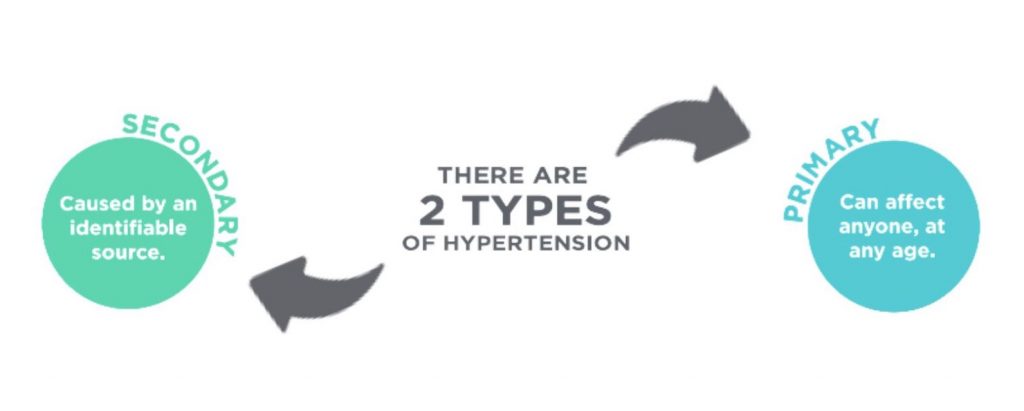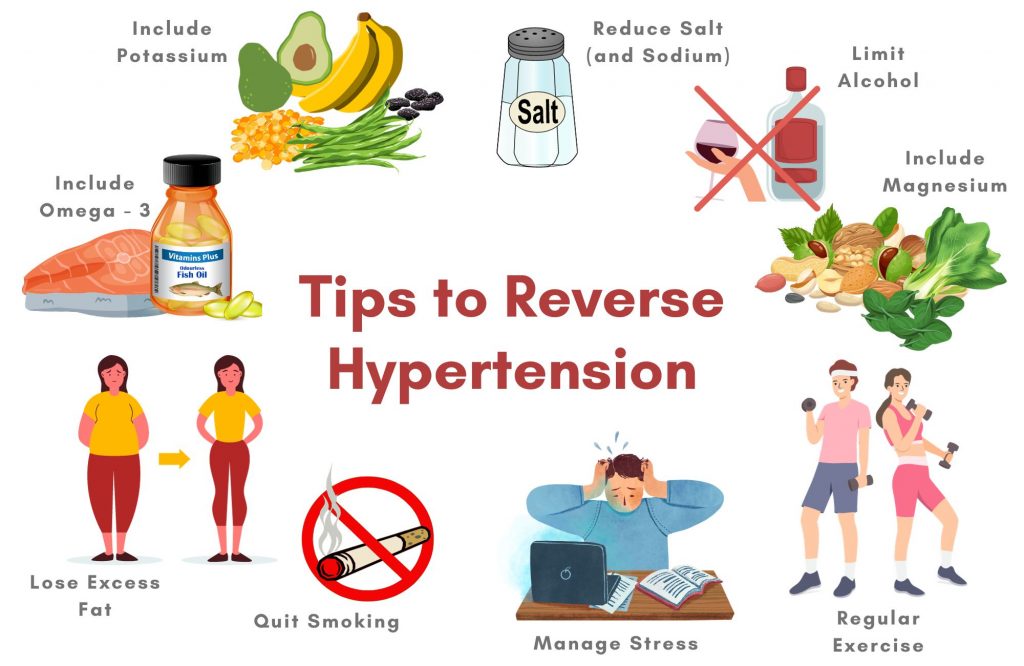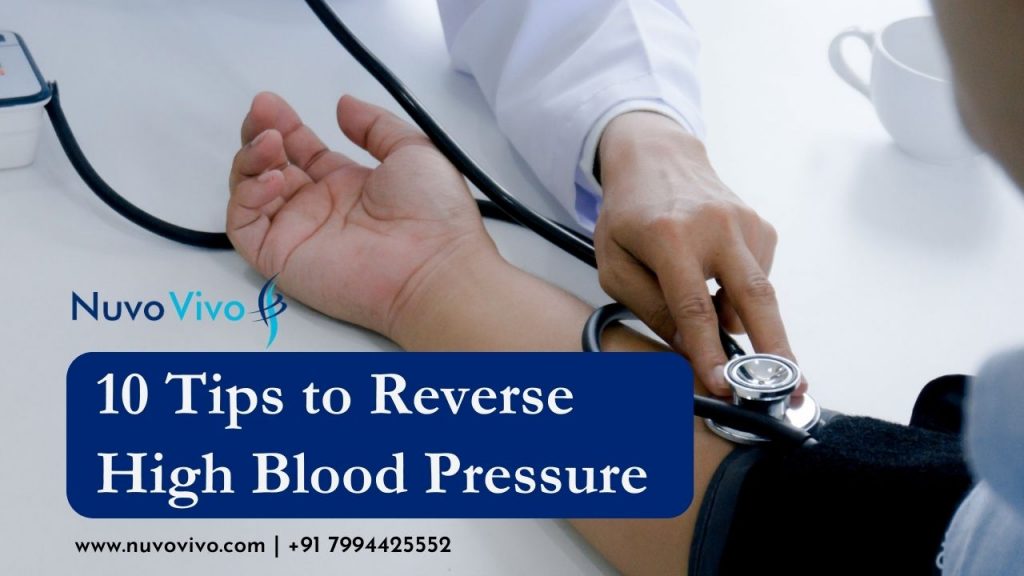Hypertension, also known as high blood pressure, is a condition in which the force of blood against the walls of the arteries is consistently too high. This can damage the blood vessels and lead to an increased risk of heart disease, stroke, and other health problems.
Hypertension is typically diagnosed through regular blood pressure screenings and can be treated with lifestyle changes, medication, and/or other medical interventions.
Blood pressure is measured in millimetres of mercury (mmHg) and is usually recorded as two numbers – Systolic pressure (the higher number) and diastolic pressure (the lower number). Systolic pressure is the pressure in the arteries when the heart beats, and diastolic pressure is the pressure in the arteries when the heart is at rest between beats. A normal blood pressure reading is typically around 120/80 mmHg. A reading of 140/90 mmHg or higher is considered hypertension.
Reasons for Hypertension
- Lifestyle factors & Obesity: A diet high in salt, unhealthy fats, and calories, lack of physical activity, smoking, and excessive alcohol consumption can all contribute to an increase in blood pressure. A bad lifestyle can lead to arteries losing their stretchiness and elasticity
- Genetics: A family history of hypertension can increase a person’s risk of developing high blood pressure.
- Age: Blood pressure tends to increase as a person gets older. As we all age, we lose a lot of muscles. This is called ”Age-related Sarcopenia’ and this leads to lower metabolism making people more susceptible to various metabolic disorders, including hypertension.
- Chronic kidney disease: The kidney is one of the prime organs that control blood pressure. Damage to the kidney due to various kidney diseases (Nephropathy) can make the blood pressure go topsy-turvy! Diabetic Nephropathy is one of the most common kidney diseases that happen due to chronic and uncontrolled blood sugar levels. High blood pressure and associated complications are very common in such people
- Hormonal imbalances: Hormonal imbalances can cause hypertension in several ways. Some hormones like renin, angiotensin etc can directly affect the constriction or dilation of blood vessels, which can raise or lower BP. Other hormones such as aldosterone can affect the body’s fluid balance, which can also affect blood pressure. High levels of stress hormones such as cortisol also can lead to an increase in blood pressure.
- Medications: Medications like birth control pills, cold remedies, and some antidepressants, can cause an increase in blood pressure.

Two types of Hypertension
Primary Hypertension – is the most common type of hypertension and is caused by a variety of factors including genetics, obesity, smoking, excessive alcohol consumption, stress, and an unhealthy diet high in salt and low in potassium. It develops gradually over time and typically has no identifiable cause. Primary hypertension is mostly attributed to a bad lifestyle where the arteries lose their stretchiness and elasticity. This leads to high blood pressure
Also Read: Tips for maintaining kidney health
Secondary Hypertension – is not very common and is mostly a result of certain medical conditions or due to some medications. Some examples of underlying medical conditions that can cause secondary hypertension include kidney disease, sleep apnea, and adrenal gland tumours. Diabetes-induced kidney damage (Diabetic Nephropathy) is the most common reason for this. Medications that can cause secondary hypertension include birth control pills, decongestants, and non-steroidal anti-inflammatory drugs (NSAIDs)

Lifestyle Tips to Manage Hypertension
Lifestyle changes can be very effective in controlling hypertension and reducing the risk of related health problems. If done in the right manner, it can even help you in reducing the medications. Any such change in medications, if required, is to be assessed and advised by your doctor only. DO NOT self-medicate or change the medicine dosages by yourself.
Here are some lifestyle changes that may help you achieve that goal:
1. Reduce Sodium
Most of us are aware that one should reduce salt to manage blood pressure. The villain here is the sodium in the table salt (Sodium Chloride). Sodium increases water retention and blood volume, which in turn increases cardiac output and hence blood pressure. It is important to remember that sodium comes from many other food sources too, and not just table salt. Almost all packaged and canned food contains sodium. Sodium in the form of sodium nitrite, sodium nitrate, sodium benzoate etc is used as an additive to improve the shelf life. Ajinomoto, which is added to food to bring in the umami flavour, also contains sodium in the form of MSG (Mono sodium glutamate).
Most of us, in our usual diet, are consuming nearly 3 gms of sodium per day – double the recommended levels. Reduce the sodium intake to below 1.5 grams per day and you may notice a 3 – 5 mm Hg reduction in blood pressure readings
2. Include Potassium
Potassium can help to counteract the effects of sodium and lower blood pressure. The more potassium you eat, the more sodium you lose through urine! The average potassium intake is 1.7 grams a day in a normal Indian diet, while the recommendation is 4.5 to 4.7 grams a day.
Increase your potassium intake to 3.5 – 4.5 grams a day and you may notice another 4 – 5 mm Hg reduction in blood pressure. Raisins, bananas, beans, lentils, avocados etc are all rich in potassium
Also Read: Acidity – Lifestyle Remedies
3. Include Magnesium
Magnesium is a mineral that plays an important role in many functions, viz – blood pressure regulation, proper muscle and nerve function, and blood sugar control. Despite its importance, many people are deficient in magnesium.
Include food rich in magnesium as it can help bring down blood pressure. Pumpkin seeds, almonds, spinach etc are all rich in Mg. A blood test is one of the ways to check for magnesium deficiency. A normal range for magnesium in the blood is generally considered to be 1.8 – 2.2 mg/dL. A level below 1.8 mg/dL is considered low and may indicate a deficiency. It’s important to note that while a serum Mg test can indicate if someone has a deficiency, it may not always be accurate as the majority of magnesium in the body is stored in bones and tissues, and only a small fraction is found in the blood. Therefore, even if the blood test results are within the normal range, it does not necessarily mean that there is no deficiency.
The recommended daily intake of Mg may vary based on gender and age. For adult men, the recommended daily intake is 400-420 mg/day, while for adult women it is 310-320 mg/day. Nuts, seeds, and green leafy vegetables are all good sources of Mg. However, for those who are deficient, supplementation may be necessary. A variety of supplements are available in the market such as magnesium citrate, magnesium glycinate, magnesium threonate, magnesium malate and more!
4. Include Omega-3
Omega-3 fatty acids are anti-inflammatory and can help in reducing the cholesterol levels in the blood. It may also help in reducing blood pressure by 2 – 3 mm Hg if combined with a balanced diet.
Fatty fish is an excellent source of omega-3. Nuts and seeds, such as flaxseeds, almonds etc are vegetarian sources of omega-3 fatty acids (ALA). Given a choice between the fish-based and plant-based omega 3, the fish-based omega 3 fatty acids are better as it is in the immediate bio-available and required form .ie EPA & DHA. The plant-based omega 3, i.e ALA, needs to be converted to EPA/DHA in our body and is often done at a low efficiency.
Also Read: Everything about Millets
5. Lose Body Fat
Being overweight or obese can increase the risk of developing hypertension. Weight loss can help regulate blood pressure by decreasing the amount of work the heart has to do to pump blood throughout the body. Remember – the higher the weight and body mass, there is more area to which the heart has to pump. Our heart hence needs to be pumping at higher pressure which leads to hypertension.
Losing weight can reduce the pressure on the blood vessels and decrease the workload on the heart, ultimately leading to lower blood pressure. Additionally, weight loss can improve the overall functioning of the cardiovascular system, which can also lead to a reduction in BP If the BMI is more than 30, the risk for cardiovascular diseases is nearly double! It is estimated that, for every kg of weight loss in a healthy manner, the systolic pressure falls by nearly 1 mm Hg. Therefore by losing 10 kg of body fat, you may be able to bring down your blood pressure by 8 – 10 mm Hg.
6. Regular Exercise
Regular physical activity can help to lower blood pressure and improve overall heart health. For a beginner, 30 minutes of moderate-intensity exercises, 5 days a week is a good start. As you become regular with exercises, gradually increase the time to 60 mins, for 5 days a week
Regular exercises can help bring down blood pressure by 2-5 mm Hg. Exercises should however be performed based on the physical conditions and abilities of a person. Structured and controlled exercises are one of the best anti-inflammatory activity
Exercises can be of 3 types – (i) Cardio Exercises (ii) Weight Training (iii) Yoga. Cardio exercises, while good for the heart, should be performed only upon the consultation of your physician or a competent lifestyle expert, in case of already existing heart conditions. Yoga is particularly helpful as it activates the parasympathetic nervous system, which is responsible for slowing down the heart rate, increasing blood flow to the gut, and promoting relaxation and bringing down the BP
Also Read: Which exercise is better? Cardio, gym or yoga?
7. Quit Smoking
Smoking can damage the blood vessels and increase the risk of hypertension and other health problems. The nicotine in the cigarette is a vaso-constrictor; it constricts the blood vessels, thereby increasing blood pressure. It also corrodes the internal walls of the blood vessels, making them more susceptible to plaque deposits and cholesterol blocks (Atherosclerosis)
8. Limiting Alcohol
Alcohol consumption can raise blood pressure through several mechanisms. Firstly, alcohol is a vasodilator, meaning it relaxes and widens blood vessels. While this initially leads to a temporary drop in blood pressure, the body responds by increasing heart rate to maintain blood flow and overall circulation. Over time, chronic alcohol consumption can contribute to sustained elevated heart rate and blood pressure.
Furthermore, alcohol can directly affect the sympathetic nervous system, which plays a role in regulating blood pressure. Excessive alcohol intake can lead to an overstimulation of this system, resulting in increased release of stress hormones such as adrenaline. This heightened sympathetic activity can cause blood vessels to constrict, raising blood pressure.
Additionally, prolonged and heavy drinking can lead to other factors that contribute to hypertension, such as weight gain, inflammation, and disruptions in sleep patterns
Stopping alcohol entirely may bring down the blood pressure by 2-5 mm Hg
9. Manage Stress
Stress can raise blood pressure, so it’s important to find ways to manage stress in your life, such as through meditation, yoga, or other relaxation techniques such as deep abdominal breathing.
Deep Abdominal breathing, also known as diaphragmatic breathing, is when you engage the entire lung (lower lobes). Breathe in for 4 seconds, and breathe out for 5 seconds. You will notice an immediate drop in the heart rate and thus the cardiac output and blood pressure.
10. Proper Sleep
Lack of sleep can contribute to an increase in blood pressure through various physiological mechanisms. One key factor is the activation of the sympathetic nervous system, which releases stress hormones like cortisol. Insufficient sleep disrupts the natural balance of these hormones, leading to heightened sympathetic activity and, subsequently, elevated blood pressure. Additionally, sleep deprivation has been linked to inflammation and oxidative stress, both of which can negatively impact blood vessel function and contribute to hypertension.
Proper sleep plays a crucial role in maintaining healthy blood pressure levels. During the deeper stages of sleep, the body undergoes essential processes for cardiovascular health, such as blood vessel repair and the regulation of stress hormones. Consistent, quality sleep helps to keep the sympathetic nervous system in check, promoting a more balanced release of hormones and reducing the overall strain on the cardiovascular system. By prioritizing adequate sleep, individuals can contribute to the prevention of hypertension and support overall heart health.

DASH Diet to Reduce Blood Pressure
The DASH diet is a dietary pattern that stands for “Dietary Approaches to Stop Hypertension” It is a diet that is rich in fruits, vegetables, whole grains, and low-fat dairy products and is low in saturated and total fat. The DASH diet also includes moderate amounts of lean meats, fish, poultry, and nuts, and is low in sugar-sweetened foods and beverages, red meats, and added fats.
The diet is designed to lower blood pressure and improve heart health by emphasizing the consumption of nutrient-dense foods that are high in potassium, magnesium, calcium, and fibre, and low in sodium. The DASH diet is also a low-sodium diet and has been shown to reduce the risk of heart disease, stroke, and other health problems.
Important Points to note
In the case of secondary hypertension, such as due to CKD (chronic kidney disease), increasing potassium & magnesium etc may not be advisable and will vary from one individual to another based on the extent of the CKD and kidney health.
Always consult your doctor and a lifestyle expert before making major dietary modifications in case of secondary hypertension (and in chronic blood pressure variations)
Also Read: Diabetes Kidney Disease – Managing Kidney Health
How can we help?
We guide our clients on a holistic journey towards managing blood pressure, enhancing heart health, and lowering cholesterol levels through personalized diet and exercise plans. Our tailored programs, facilitated by certified dieticians and exercise experts, prioritize individual needs. We provide unwavering support and guidance, ensuring a seamless experience. Moreover, clients have the option to consult with our esteemed advisory panel of physicians and cardiologists. Our overarching objective is to empower clients to minimize their dependence on medications by embracing structured and evidence-based lifestyle changes.
About NuvoVivo
NuvoVivo is an online health and fitness company that helps its clients manage lifestyle diseases. Our clients join us from across the world to manage acidity or reverse conditions such as diabetes (and its complications), cardiovascular diseases (hypertension, high cholesterol), fatty liver, PCOS, thyroid disorders, IBS etc. We help them reduce their reliance on medications through structured and scientific lifestyle changes that suit their cultural habits and medical conditions. Our team provides a diet plan, exercise plans and the necessary follow-up and support to help them achieve this
Reach for Consultations @ https://bit.ly/NVConsultation
More about NuvoVivo @ https://linktr.ee/nuvovivo
References
- Appel, L. J., Frohlich, E. D., Hall, J. E., Pearson, T. A., Sacco, R. L., Seals, D. R., … & Van Horn, L. (2011). The importance of population-wide sodium reduction as a means to prevent cardiovascular disease and stroke: A call to action from the American Heart Association – Source
- Hatzistavri, L. S., Sarafidis, P. A., Georgianos, P. I., Tziolas, I. M., Aroditis, C. P., Zebekakis, P. E., … & Ruilope, L. M. (2009). Oral magnesium supplementation reduces ambulatory blood pressure in patients with mild hypertension. – Source
- Geleijnse, J. M., Giltay, E. J., Grobbee, D. E., Donders, A. R., Kok, F. J. (2002). Blood pressure response to fish oil supplementation: metaregression analysis of randomized trials. – Source
- Aburto, N. J., Hanson, S., Gutierrez, H., Hooper, L., Elliott, P., & Cappuccio, F. P. (2013). Effect of increased potassium intake on cardiovascular risk factors and disease: systematic review and meta-analyses. – Source
- Neter, J. E., Stam, B. E., Kok, F. J., Grobbee, D. E., & Geleijnse, J. M. (2003). Influence of weight reduction on blood pressure: a meta-analysis of randomized controlled trials. Source
- Neter, J. E., Dijkstra, S. C., Dekker, J. M., Grobbee, D. E., Heine, R. J., & Geleijnse, J. M. (2007). Impact of weight change on changes in blood pressure in a population-based cohort. Source
- Hall, J. E., do Carmo, J. M., Da Silva, A. A., Wang, Z., & Hall, M. E. (2015). Obesity, kidney dysfunction and hypertension: mechanistic links. Source
- Puddey, I. B., Rakic, V., Dimmitt, S. B., Beilin, L. J., & Vandongen, R. (1999). Influence of pattern of drinking on cardiovascular disease and cardiovascular risk factors— A review. Source
- Puddey, I. B., Beilin, L. J., & Vandongen, R. (1987). Regular alcohol use raises blood pressure in treated hypertensive subjects: a randomised controlled trial. Source
- Tochikubo, O., Ikeda, A., Miyajima, E., & Ishii, M. (1996). Effects of insufficient sleep on blood pressure monitored by a new multibiomedical recorder. Source
- Sparrenberger, F., Cichelero, F. T., Ascoli, A. M., Fonseca, F. P., Weiss, G., Berwanger, O., … & Moreira, L. B. (2009). Does psychosocial stress cause hypertension? A systematic review of observational studies. Source

